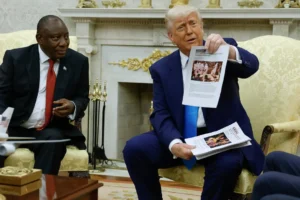
Exceptionalism: A Pathway to Division, Conflict, and Uncertainty
Exceptionalism, defined as the belief that a group, entity, or species is inherently superior or distinct from others, has permeated many layers of society. From small businesses to governments, ethnicities, and even humanity’s perception of itself, exceptionalism fosters the illusion of separateness. This belief often leads to conflict, division, and misunderstanding by fueling a misguided sense of superiority. In this discussion, we’ll explore how exceptionalism takes root across different scales of society and examine ways to move beyond this limiting worldview to foster unity and peace.
Exceptionalism and the Human Condition: A Unique Perspective?
One of the most pervasive forms of exceptionalism lies in humanity’s belief in its unique consciousness. Throughout history, humans have considered themselves the only beings capable of self-awareness, complex thought, and moral judgment. While other species demonstrate intelligent behaviors, humans have largely assumed themselves to be the apex of evolution (Mooallem, 2020). However, studies show that animals possess remarkable cognitive abilities, from elephants’ mourning rituals to dolphins’ language-like communication patterns, suggesting we may not be as uniquely conscious as once believed (Bekoff, 2007).
Moreover, science is aware of only 4.5% of observable reality, with dark matter and dark energy making up the remaining 95.5%, an unknown realm that defies current understanding (Perlmutter et al., 1999). By assuming that consciousness or intelligence exists only within humans, we ignore the vast mysteries beyond our perception. As science advances, the understanding that consciousness may not be an exclusively human attribute is becoming a plausible idea, broadening our perspective on life and matter as interconnected parts of a larger whole.
The Dangerous Roots of Cultural and Racial Exceptionalism
Exceptionalism, when tied to ethnicity or race, has historically led to some of humanity’s darkest periods. Groups claiming superiority based on racial or ethnic identity create narratives that justify exclusion, exploitation, and even extermination of those deemed inferior. For example, the concept of European exceptionalism, particularly during the colonial period, led to the exploitation of entire continents and the systematic oppression of non-European peoples (Said, 1978). A similar pattern is seen in religious exceptionalism, where certain groups believe their divine mandate sets them apart, fostering conflict with others who do not share their beliefs (Armstrong, 2014).
The Jewish people’s history also illustrates the impact of exceptionalism, both externally imposed by others and sometimes cultivated within. Persecuted throughout history, Jewish communities developed a strong, sometimes insular identity that was both a source of resilience and division, as seen in the hostilities experienced in regions like Europe and the Middle East. Exceptionalism, whether self-identified or imposed, often breeds fear, distrust, and intractable conflict that reverberates across generations (Friedman, 2019).
The Illusion of Superiority and Its Consequences
Exceptionalism breeds fear and separation because it encourages an “us versus them” mentality, justifying actions that perpetuate inequality and resentment. In business settings, for instance, when companies cultivate a culture of superiority, this mindset can lead to toxic work environments where collaboration is stifled, and other organizations are viewed solely as competitors rather than potential partners. For NGOs, it might manifest as a belief that their mission or approach is the only correct one, leading to conflicts with others working toward similar goals.
In governments, exceptionalism often morphs into nationalism, a driving factor behind war and territorial disputes. As nations view themselves as inherently superior or “chosen,” they justify actions that could lead to harm or exploitation of other countries (Snyder, 2018). On a macro scale, humanity’s belief in its own exceptionalism as the only sentient life in the universe raises moral and ethical concerns about how we treat other life forms and ecosystems, promoting exploitative practices that ignore the interconnectedness of life.
Moving Beyond Exceptionalism: Toward Unity and Understanding
To break free from the trap of exceptionalism, societies and individuals must embrace a mindset of inclusivity and shared experience rather than one of superiority. Here are some approaches:
- Encourage Empathy and Humility: Recognizing the limitations of human perception is the first step. We must accept that our understanding of consciousness, life, and the universe is limited. Encouraging individuals and societies to remain open to new knowledge fosters a more interconnected worldview. Embracing concepts such as the Earth Charter or other ecological initiatives can help emphasize a shared responsibility rather than a hierarchy of beings (Callicott, 2017).
- Foster Cross-Cultural Dialogue and Collaboration: By promoting collaboration and dialogue, whether at the workplace, community, or national level, we can challenge exceptionalist beliefs. Learning from diverse perspectives enhances empathy and breaks down perceived barriers between groups.
- Redefine Success as Collective Growth: Exceptionalism often defines success as domination or superiority. A shift toward collective growth—where the success of one group contributes to the prosperity of all—can reduce conflict. This approach is particularly relevant in global governance, where cooperative policies on issues such as climate change, public health, and poverty reduction can unite rather than divide nations.
- Cultivate Respect for All Forms of Life: Acknowledging the value of all life forms helps break down the walls of human exceptionalism. Ecological and environmental education can instill respect for biodiversity, urging individuals to see themselves as part of the planet’s ecosystem rather than its ruler (Leopold, 1949).
Conclusion
Exceptionalism may feel empowering, but it comes with a high cost: it isolates, divides, and fosters conflict. Whether on an individual, cultural, or societal scale, exceptionalism is a barrier to unity and mutual respect. By cultivating a sense of shared humanity and interconnectedness, individuals and communities can move beyond the limitations of superiority and embrace a world where differences are celebrated rather than feared.
References
- Armstrong, K. (2014). Fields of Blood: Religion and the History of Violence. Knopf Canada.
- Bekoff, M. (2007). The Emotional Lives of Animals: A Leading Scientist Explores Animal Joy, Sorrow, and Empathy — and Why They Matter. New World Library.
- Callicott, J. B. (2017). Thinking Like a Planet: The Land Ethic and the Earth Ethic. Oxford University Press.
- Friedman, T. L. (2019). From Beirut to Jerusalem. Farrar, Straus, and Giroux.
- Leopold, A. (1949). A Sand County Almanac. Oxford University Press.
- Mooallem, J. (2020). This Is Chance!: The Shaking of an All-American City, A Voice That Held It Together. Random House.
- Perlmutter, S., Aldering, G., Goldhaber, G., Knop, R. A., Nugent, P., Castro, P. G., & Supernova Cosmology Project (1999). Measurements of Omega and Lambda from 42 High-Redshift Supernovae. The Astrophysical Journal, 517(2), 565–586.
- Said, E. (1978). Orientalism. Pantheon Books.
- Snyder, T. (2018). The Road to Unfreedom: Russia, Europe, America. Tim Duggan Books.



